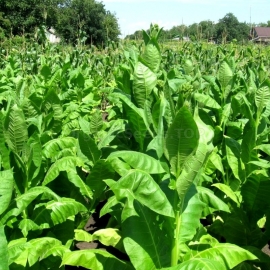 EXCLUSIVE
EXCLUSIVE
«Cuban Criollo» Heirloom Tobacco Seeds
-
Herloom Tobacco «Cuban Criollo»
Cuban Criollo is one of the most valued strains for Cuban cigars. It originated from a crossing between the varieties 'Havana 92' and `Habana P.R'.
Cultivated in the sun it produces from 14 to 16 useful leaves per plant and makes an excellent binder. It reaches an average height of 6 feet. Leaves average 24 inches in length and 12 inches wide. It is resistant to the Blue Mold, the Blackish Paw and the Tobacco Mosaic Virus and moderately resistant to the Environmental Necrosis.
Heirloom Tobacco Seeds Planting Instructions
Sow tobacco seeds indoors in flats, trays or small pots 6-8 weeks before transplanting. A plastic tray with 4 or 6 packs inserts works very well. Fill trays approximately 3 inches deep with a fine starting mix soil or potting soil. Pack soil very lightly. Potting soil should be screened to remove any large chunks. Thoroughly soak soil and let drain before seeding. Do not use garden soil.
Sprinkle 2-3 tobacco seeds in each pot on top of the moistened soil. Do NOT cover seed. Mist the seeds lightly with a spray bottle and cover the tray loosely with a plastic dome or sheet of clear light plastic film. Do not seal tightly. Leave a corner propped up to allow some air exchange. Place in a well lit area near a window or under grow lights where the temperature is a constant 70-80 degrees. Do not exceed 85 degrees. Mist the trays daily and keep the soils surface moist at all times. Seeds will germinate in 7-14 days. Tobacco seed germination is very temperature dependant. Lower temperatures will greatly delay germination.
When the tobacco seeds start sprouting, remove the plastic cover and move to a fully light area such as a greenhouse, cold frame or under grow lights. Keep soil moist at all times, but do not over water. Water when the surface of the soil first begins to appear dry. Over watering may cause seedlings to dampen off, and impedes root development. Thin or divide tobacco seedlings to 1 per pot.
Planting instructions for tobacco plants
Set seedlings outside in filtered sunlight for 2-4 hours per day for a week before planting to acclimate and harden off the tobacco seedlings. Plant seedlings in rows spaced 2 feet in all directions after all danger of frost has passed. Keep soil moist until plants are established. It is normal for plants to wilt after transplanting and appear not to grow at all during the first 2 weeks. All the growth is taking place under ground at this stage. Once established, tobacco requires little water. Fertilize lightly at planting and again in 4-6 weeks only if needed.
Cut off the flower heads when they appear. Topping forces the energy into the leaves making them larger and thicker. Cut off suckers (side branches) when topping. Leaves ripen 2-3 weeks after topping and are ready to harvest when they turn yellow, or become a mottled green and yellow with curled edges.
Harvesting and curing tobacco
Tobacco leaves may be picked as they ripen (primed) and strung on wire or string with ½ inch of space between them for curing. Whole plants can be cut and hung when 50% of the leaves show signs of ripening. Curing (aka color curing) happens when chlorophyll in the leaf breaks down and the leaf changes from green or yellow to brown. Hang leaves or plants in an area where you can maintain a daily average of 70-80% humidity to cure and dry. Basements or outdoor sheds often make great curing locations. If dried to quickly, the leaf will not cure and will dry green. Tobacco that fails to cure and dries green is unsmokable.
After curing, continue to dry the tobacco leaf until it is completely dry and the main stem snaps like a twig. Once cured and dried, the leaf can be left to hang and age where it is, or brought back into case (re-humidified until the leaf is pliable) then packed into cardboard boxes for storage and to age. Aging allows time for nitrogen compounds in the leaf to break down, which removes the harshness of freshly cured tobacco and lets the true flavors come through.
